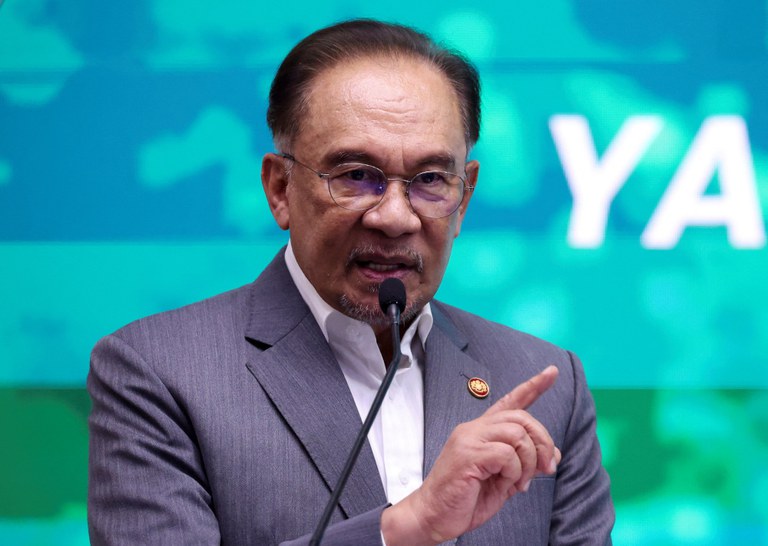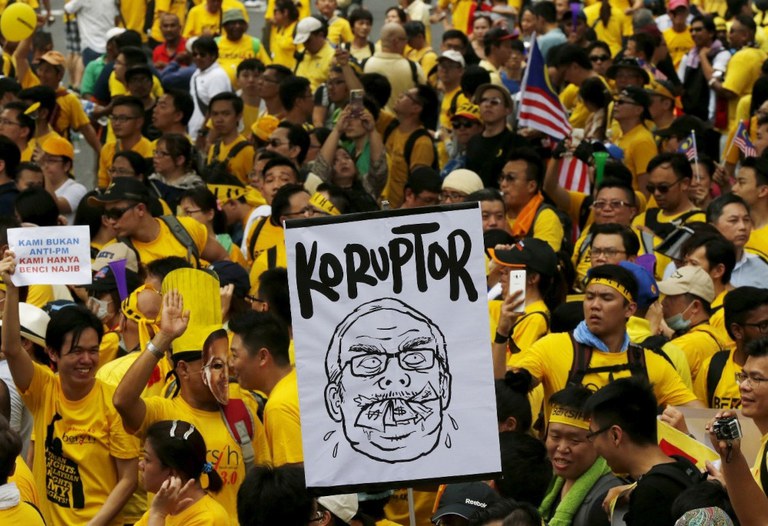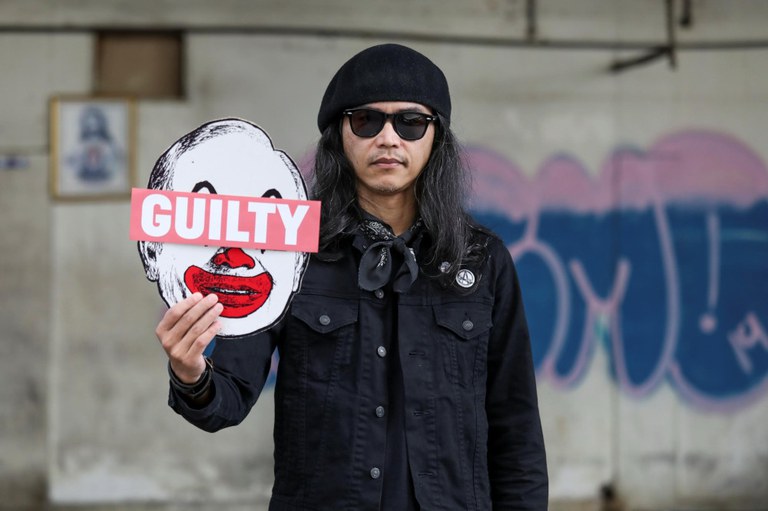Activists: Malaysia’s decade-old crackdown on free speech shows no signs of easing
2025.03.31
Kuala Lumpur
 Then-Bersih Chairwoman Maria Chin Abdullah leads supporters toward Dataran Merdeka during a rally in Kuala Lumpur calling for Prime Minister Najib Razak to resign over the 1MDB financial scandal, Aug. 29, 2015.
Then-Bersih Chairwoman Maria Chin Abdullah leads supporters toward Dataran Merdeka during a rally in Kuala Lumpur calling for Prime Minister Najib Razak to resign over the 1MDB financial scandal, Aug. 29, 2015.
Anwar Ibrahim’s government has done little to break a pattern of curbs to free speech since he took office as the Malaysian prime minister in 2022 on a pledge to restore democracy and repeal draconian provisions, critics say.
His administration is among successive governments that have wielded sweeping laws during the past decade to silence journalists, activists and opposition voices who criticize the government despite constitutional protections for such freedom, according to human rights advocates.
The playbook, as they described it, has remained the same across five administrations from 2015 on – target journalists, human rights defenders, cartoonists and opposition figures while controlling public narratives.
And while digital activism once offered a refuge, there’s been a surge in cases in the years under Anwar where Malaysian authorities have expanded their reach into cyberspace. They’ve been clamping down on hate speech in this multi-ethnic and multi-religious country, where racial tensions bubble under the surface of politics.
“[I]t is clear that Malaysia has not excelled in upholding the right to freedom of expression,” said Nalini Elumalai, senior Malaysia program officer at Article 19, a group advocating free- speech reforms.
“This has been true regardless of which government has been in power. The highly censorious environment makes it difficult for individuals to express their views without facing consequences – especially when it comes to political speech or issues related to race, religion, royalty and corruption,” she told BenarNews.
RELATED STORIES
Malaysia Renews Controversial Detention Clause for 5 Years
Malaysia’s parliament repeals controversial provision in security law
Revisions to Controversial Security Laws Pending, Malaysian Official Says
The crackdown on politics-related speech began in 2015, when a citizen-based grassroots movement organized massive street demonstrations in Kuala Lumpur to speak out against deep-seated corruption in government. Then-Prime Minister Najib Razak was mired in a financial scandal that ultimately brought him down.
Anwar, a pro-democracy icon and opposition leader at the time, was in jail. He later joined forces with former PM Mahathir Mohamad to lead the opposition to an electoral victory that swept Najib and his United Malays Nationalist Organization (UMNO) party from power in 2018.

The crackdown on free speech has continued under Anwar since he took power in November 2022, critics said. They cited the prolonged use of the Sedition Act and the Communications and Multimedia Act (CMA) against dissent.
Under his watch, there also has been a rise of cases under those laws that veer into hate speech tied to the so-called 3Rs – race, religion and royalty. Late last year, the government began talking about a potential new law that would penalize people who stir up communal tensions.
The 2022 election manifesto of Anwar’s Pakatan Harapan coalition had pledged to review and repeal “provisions of acts that can be abused to restrict free speech.”
Anwar came to power through forging an alliance with former foe UMNO, a race-based party that represents the country’s Malay-Muslim majority.
But about a year after taking office, he warned there would be some limits on speech.
“I do not agree that the Sedition Act should be used against those who criticise the prime minister and the government, but we will not tolerate anyone who tries to incite or slander to the point of touching on the 3R issues (rulers, race, religion) ... let the police take action,” local media quoted Anwar as saying in a speech in September 2023.
“You can criticise anything and anyone... but if you use sentiments, incite the Malays to hate the Chinese, incite people to use religion to accuse others of infidelity ... I stress that I will not tolerate it,” he said.
Targeting grassroots protests
The curbs on free speech first began when Najib’s government cracked down on the Bersih 4 and Bersih 5 rallies in 2015 and 2016. Bersih had been founded in 2007 by civil society groups to demand transparency in the Malaysian electoral system.
During the two rallies, protesters sought electoral reforms and government accountability amid the 1Malaysia Development Berhad (1MDB) financial scandal under Najib, the now-jailed former prime minister.
At that time, journalists investigating corruption at the highest levels also faced harassment, travel bans and legal action. The government suspended the country’s leading financial daily newspaper along with news portal The Malaysian Insider because of reporting on the scandal.

Maria Chin Abdullah, who was then the chairwoman of Bersih, was arrested under the counterterrorism Security Offenses (Special Measures) Act 2012 (SOSMA) over allegations that she was a threat to national security.
Chin was taken into custody on the eve of a protest in November 2016 that she and other activists were organizing in Kuala Lumpur to highlight Najib’s involvement in the 1MDB scandal. He was convicted and sent to prison in 2022 on charges of massive corruption and abuse of power linked to a 1MDB subsidiary.
“Protest is our right. If it’s done peacefully, it should be allowed,” she told BenarNews in a phone interview this week.
“Though free speech still exists, the government has overreacted. Their tendency is to haul people in for investigation.”
Two years after the protests, the reformist Pakatan Harapan coalition pulled off an election upset, which drove UMNO from power after 57 years of unbroken rule.
Little changed under Mahathir Mohamad, whose Pakatan Harapan coalition led the country from May 2018 until February 2020. During his previous term as prime minister, from 1981 to 2003, human rights watchdogs complained about authoritarian rule.
Pakatan’s 2018 pledge to repeal repressive laws, including the Sedition Act, went unfulfilled, and by 2019, those same laws were being used against critics.
Political instability in 2020 accelerated the crackdown, with the COVID-19 pandemic providing a pretext to target dissent under “fake news” provisions.
Crackdown
Anwar took over as PM in late 2022, following short prime ministerial stints by Muhyddin Yassin and Ismail Sabri Yaakob.
Observers noted that Anwar’s administration remains firm on the need to maintain public order by cracking down on hate speech linked to any of the 3Rs. It has insisted that “while free speech exists, some restrictions are necessary for public safety.”
In 2023, Kedah Chief Minister Muhammad Sanusi Md Nor, from the opposition Malaysian Islamic Party (PAS), was convicted of insulting the monarchy in a political speech. The conviction was dropped last month after the Attorney General’s Chambers withdrew the charges.

Meanwhile in December 2024, activist Fahmi Reza was investigated under the Sedition Act and the communications law for satirical posts that criticized Sabah state’s choice as governor of a politician accused of graft.
On Feb. 20, Home Minister Saifuddin Nasution told Parliament there was no arbitrary use of the Sedition Act, citing a “consistent” trend in investigation numbers. Authorities opened 94 cases under the law in 2024 – compared to 109 in 2015, he said.
Saifuddin and Communications Minister Fahmi Fadzil did not respond to BenarNews text messages and phone calls requesting comment.
Vilasini Vijandran, interim executive director of Amnesty International Malaysia, challenged Saifuddin’s claim.
There is “a failure to justify the government’s continued retention of draconian laws that they themselves had previously pledged to repeal,” she told BenarNews.
Wathshlah Naidu, executive director of the Centre for Independent Journalism, warned that laws including the Sedition Act and CMA remained “a convenient tool to silence those who challenge power.”
In Sabah, activist Mukmin Nantang, who was detained last year as a result of protest videos showing the destruction of sea gypsies’ homes, expressed his frustration over such investigations.
“When I raised issues with facts on social media, I was investigated under the Sedition Act. This has badly affected my activism,” he told BenarNews.
He said the investigation was meant to tarnish his name and paint him as a troublemaker.
“Now, I have to constantly rethink – will speaking up get me in trouble again?”







